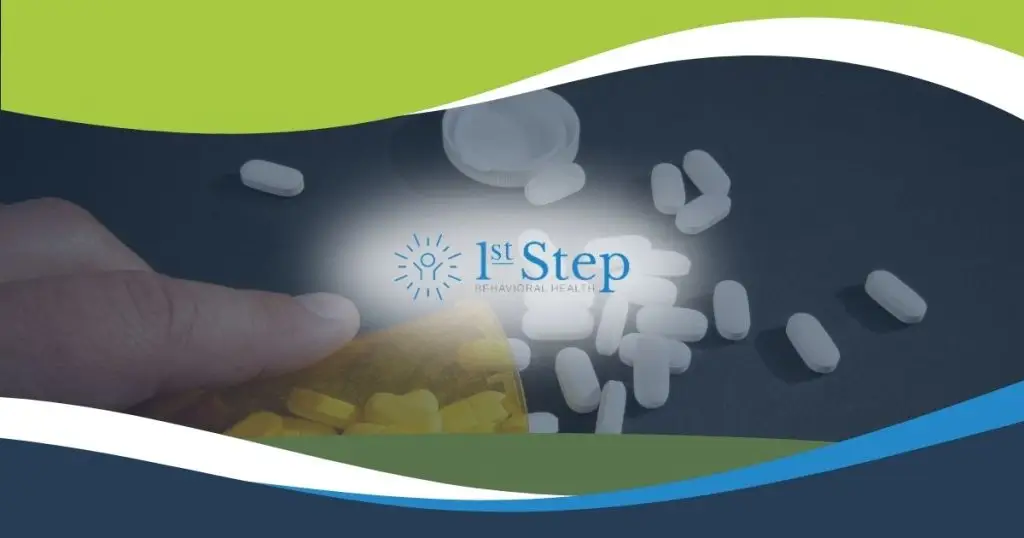Vicodin is an addictive prescription pain reliever. Many people believe that it is always safe to take prescription medications. However, misusing prescription drugs like Vicodin can be dangerous.
Some people who misuse Vicodin may become addicted to it. People with Vicodin addiction often need professional treatment to stop using it.
This article will explore how Vicodin addiction develops and how to recognize it. You will also learn how to find Vicodin addiction treatment in Pompano Beach.
Contact the First Step Behavioral Health specialists now to explore your treatment options. You may also verify your insurance or schedule an intake into our treatment facility.
What is Vicodin?
Vicodin is the brand name for a prescription painkiller containing hydrocodone and acetaminophen. Hydrocodone is an opiate. This means that it is derived from the opium poppy plant. Opiates are highly addictive.
Doctors typically prescribe Vicodin and other opiates for short periods to reduce the risk of addiction. However, some people may develop an addiction to Vicodin even if they use it as prescribed. Misusing Vicodin increases the risk of addiction.
Vicodin addiction can lead to long-term and life-threatening problems, including overdose. People who develop an addiction to Vicodin must seek treatment as quickly as possible.
Understanding Vicodin Addiction
Most healthcare professionals believe that Vicodin is safe if people use it exactly as prescribed. Doctors may prescribe it to relieve pain. However, Vicodin has other side effects. Some of the effects of Vicodin are pleasant. People may like the way they feel when they take Vicodin.
Vicodin and other opiates may cause euphoria. Euphoria is a rush of intense pleasure, well-being, and warmth. This can make them want to take more Vicodin than they should.
People who misuse Vicodin may develop a physical dependence on it. Vicodin misuse includes:
- Taking higher doses of Vicodin than prescribed
- Taking it more often than prescribed
- Continuing to take Vicodin for a longer period than prescribed
- Taking a different form of Vicodin
- Using Vicodin differently than prescribed, such as crushing and snorting the pills
- Using Vicodin without a prescription
Misusing Vicodin can lead to tolerance. Tolerance means that your body has adjusted to the amount of Vicodin you have been taking. People with tolerance may need to take higher doses of Vicodin to get the effects they want.
Abusing Vicodin can lead to physical dependence and addiction. People with addiction may require professional treatment to manage Vicodin withdrawal symptoms and avoid relapse.
What are the Risk Factors for Vicodin Addiction?
Anyone can develop an opioid use disorder. Millions of people in the United States take opiates and opioids to manage pain. Many become addicted to them.
Certain risk factors may make it more likely that you’ll develop Vicodin abuse or addiction. These include:
- A personal history of substance abuse
- A history of trauma
- A mental health condition, such as depression or bipolar disorder
- A family history of substance abuse or addiction
If you take Vicodin, take it exactly as prescribed. Watch for signs of addiction. Talk to your doctor about your risk of developing a substance use disorder. Seek treatment as soon as you realize you need help.
Signs of Vicodin Addiction
Vicodin addiction can change the way you think and behave. Some of the signs of Vicodin addiction include:
- Having cravings for Vicodin
- Misusing Vicodin by taking it differently than prescribed or without a prescription
- Needing to take more Vicodin to get the desired effects
- Wanting to stop taking Vicodin but finding it impossible to quit on your own
If you recognize these signs of addiction, you must seek treatment. Medication-assisted treatment can help you safely stop using Vicodin and avoid relapse.
Treatment for Vicodin Addiction
Before starting a treatment program, your doctor or addiction specialist will evaluate your needs during treatment. This assessment will determine whether you need outpatient or inpatient treatment.
Many people begin their recovery journey in an inpatient rehab program before transitioning into outpatient care.
Vicodin Detox
During the first stage of recovery, you will receive medical detox treatment to help you manage withdrawal symptoms. Vicodin withdrawal symptoms can include:
- Stomach cramps
- Muscle aches
- Excessive sweating
- Nausea
- Vomiting
- Agitation
- Insomnia
- Runny nose
- Watery eyes
Treatment during detox includes constant monitoring, medications, and emotional support.
Vicodin Addiction Treatment Programs
After detox, people continue to follow a treatment program that includes:
- Screenings
- Round-the-clock support
- Medications to reduce the risk of relapse
- Mental health treatment
- Individual counseling
- Family therapy
- Group therapy
- Relapse prevention education
- Exercise, nutrition support, mindfulness, and other holistic therapies
After completing a treatment program, it’s important to follow an aftercare plan to keep you engaged in your recovery.
Find Vicodin Addiction Treatment in Pompano Beach
If you or someone you love needs the support of an addiction treatment center in Pompano Beach, you are not alone. Contact the team at First Step Behavioral Health now to explore your treatment options.

